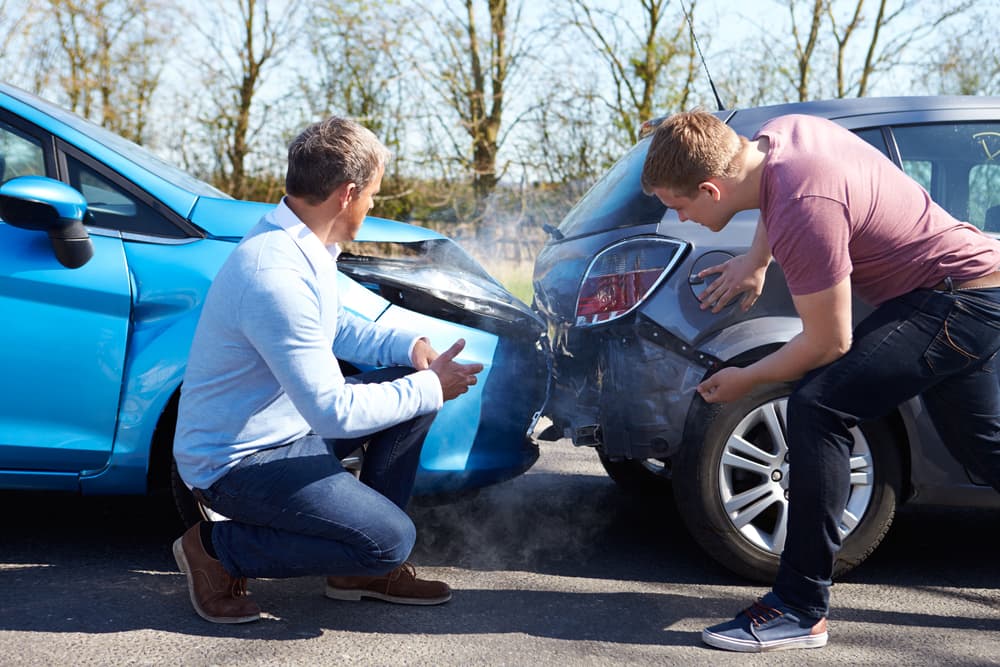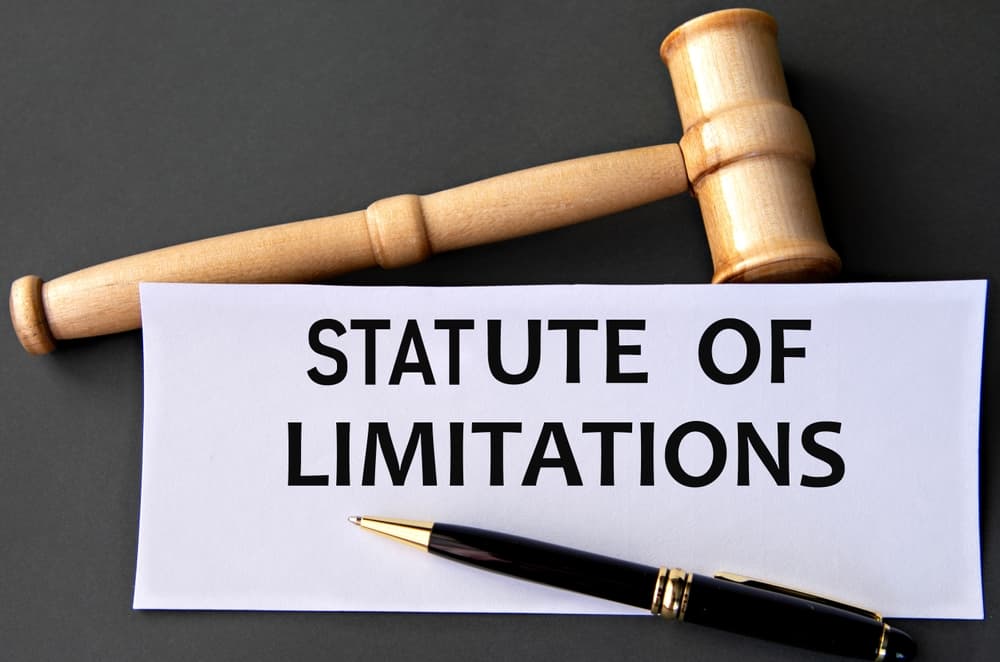Rear-end collisions are one of the most common types of car accidents, and after a rear-end collision, you should understand who is responsible for paying for the damages and injuries incurred.
Below, we will explore the various factors involved in determining liability and provide valuable insights on why you need a car accident lawyer to navigate the legal process. If you have injuries from a crash, do not delay in consulting a law firm in your area.
Schedule a Free Initial Consultation Today!
What Is a Rear-End Collision?

A rear-end collision is a type of car accident that occurs when one vehicle crashes into the back of another vehicle. It is one of the most common types of accidents on the road and can lead to injuries and property damage. Rear-end collisions can happen at any speed, from low-speed fender benders to high-speed highway accidents.
These accidents are often caused by a driver's negligence, such as distracted driving, tailgating, or failing to apply brakes in time. Weather conditions, mechanical failure, and road hazards can also contribute to rear-end collisions.
Fault in Rear-End Collisions
Determining fault in a rear-end collision is usually straightforward. The driver who rear-ends another vehicle is usually at fault. This is because drivers must maintain a safe distance from the car in front of them and be prepared to stop or slow down when necessary.
However, there are exceptions to this general rule. For example, suppose the driver in front suddenly stops or reverses without warning. In that case, they may share some of the responsibility for the accident.
Additionally, if the driver who rear-ends another vehicle can prove that they were not at fault or that the accident was unavoidable, someone else may bear partial responsibility.
Common Causes of Rear-End Collisions
Rear-end collisions can be caused by various factors, but some causes are more common than others. Distracted driving is one of the most prevalent causes, particularly using a cell phone while behind the wheel. Other common causes include:
Distracted Driving
In today's digital age, distracted driving has become a prevalent road issue. With the widespread use of smartphones and other devices, drivers often engage in activities that divert their attention from the road, such as texting, browsing social media, or watching videos.
Distracted driving can lead to delayed reaction times, making it more likely for a rear-end collision to occur. If the rear driver was distracted at the time of the accident, they may be held liable for the damages and injuries caused.
Tailgating
Following too closely, known as tailgating, is a common cause of rear-end collisions. If a driver fails to maintain a safe distance from the vehicle ahead, they may not have enough time to react and stop in case of a sudden change in traffic flow. Rear drivers who collide with the vehicle in front due to tailgating are often deemed at fault for the accident.
Speeding
Excessive speed reduces a driver's ability to stop or slow down promptly. When a driver is traveling above the speed limit or too fast for the given conditions, they put themselves and others at risk. If a speeding driver rear-ends another vehicle, they are typically considered responsible for the collision.
Sudden Stops
Sometimes, a front driver makes an abrupt stop, catching the rear driver off guard and leading to a rear-end collision. While the initial instinct may be to blame the rear driver, carefully examining the circumstances is necessary. If the front driver made the sudden stop without a valid reason or failed to use proper signaling, they might share or bear full responsibility for the accident.
Other causes of rear-end collisions include:
- Weather: Rain, fog, or ice can make it harder to see and stop in time.
- Fatigue: Drowsy driving can impair a driver's reaction time and judgment.
- Mechanical failure: Brake failure or malfunctioning taillights can increase the risk of a rear-end collision.
- Road hazards: Potholes, debris, or obstacles in the road can cause a driver to stop suddenly and increase the chance of being rear-ended.
Rear-end collisions can happen to anyone, regardless of their driving skills or experience. Even the most cautious driver can become a victim if they are in the wrong place at the wrong time.
Types of Injuries Caused by Rear-End Accidents
Rear-end accidents can result in various injuries, ranging from minor to severe. Seek immediate medical attention after being involved in such an accident, even if you do not initially feel any pain or discomfort.
Some injuries may not manifest symptoms right away but can still have long-lasting effects if left untreated. Your legal claim will require medical records that connect your injuries to the accident.
Here are some common types of injuries that can occur in rear-end collisions:
- Whiplash: Whiplash is one of the most common injuries sustained in rear-end accidents. It occurs when the neck is forcefully jerked back and forth, causing strain or damage to the neck's soft tissues, muscles, and ligaments. Symptoms of whiplash include neck pain, stiffness, headaches, dizziness, and difficulty moving the neck.
- Back Injuries: The force of impact in a rear-end collision can cause significant damage to the spine and surrounding structures in the back. Herniated discs, spinal fractures, and sprains or strains are common back injuries that can result from these accidents. Depending on the severity of the injury, individuals may experience pain, limited mobility, and even nerve damage.
- Head and Brain Injuries: When a vehicle is rear-ended, the occupants may experience a sudden jolt or impact to the head, leading to head and brain injuries. Concussions, traumatic brain injuries (TBI), and skull fractures are some of the potential injuries that can occur. These types of injuries can have long-term effects on cognitive function, memory, and overall quality of life.
- Facial Injuries: The face is vulnerable to injury during a rear-end collision, as it may come into contact with the steering wheel, dashboard, airbag, or other objects within the vehicle. Facial fractures, lacerations, and bruising are common injuries that can result from these impacts. In severe cases, individuals may require reconstructive surgery or treatment for dental injuries.
- Psychological and Emotional Injuries: Being involved in a rear-end accident can have lasting psychological and emotional effects. Many individuals may experience anxiety, depression, post-traumatic stress disorder (PTSD), or other mental health conditions as a result of the trauma. Be sure to seek professional help if you are struggling with the emotional aftermath of an accident.
If you have suffered an injury in a rear-end accident, now is the time to consult with a qualified car accident attorney. An attorney can help you navigate the legal process, protect your rights, and pursue the compensation you deserve for your injuries and damages. They will work diligently to gather evidence, negotiate with insurance companies, and advocate for your best interests.
The aftermath of a rear-end accident can be overwhelming and stressful. Hiring an attorney will provide you with the support and guidance you need during this challenging time. Don't hesitate to contact a trusted attorney who can help you understand your legal options and fight for the justice you deserve.
Liability in Rear-End Collisions
Liability in rear-end collisions is typically straightforward, with the driver who rear-ends another vehicle being considered at fault. They must pay for the damages and injuries caused by the accident. However, as mentioned earlier, there can be exceptions to this rule.
Liability can change depending on the jurisdiction. Each state has its own laws regarding fault and liability in car accidents, so consult a knowledgeable attorney who can provide guidance specific to your situation.
Insurance Coverage for Rear-End Collisions
When it comes to insurance coverage for rear-end collisions, several types of coverage may come into play.
These include:
- Liability coverage: This type of coverage is mandatory in most states and covers the damages and injuries of the other driver if you are at fault in a rear-end collision.
- Personal injury protection (PIP): Some states require PIP coverage, which provides medical expenses and lost income for the insured and their passengers, regardless of who is at fault.
- Uninsured/underinsured motorist coverage: This coverage protects you if the at-fault driver does not have insurance or enough coverage to compensate you fully for your damages and injuries.
Review your insurance policy and understand your coverage in case of a rear-end collision. An attorney specializing in personal injury cases can help you understand your coverage.
Seeking Compensation in Rear-End Collisions
If you are the victim of a rear-end collision, seek compensation for your injuries and damages. The process typically involves filing a claim with the at-fault driver's insurance company or your own insurance company, depending on the circumstances.
To strengthen your case, you or your car accident lawyer will need to gather:
- Police reports
- Photos of the accident scene and damages
- Witness statements
- Medical records and bills
- Repair estimates
Insurance companies may try to undervalue your claim or deny it altogether. A skilled car accident attorney can navigate the complexities of the claims process and negotiate a fair settlement on your behalf.
The Statute of Limitations for Injury Accidents

When it comes to rear-end collisions, one of the most important things to understand is the statute of limitations for filing a personal injury claim. The statute of limitations refers to the timeframe for filing a lawsuit after an accident occurs. If you miss this deadline, you may lose your right to seek compensation for your injuries.
In most cases, victims of car accidents have a limited amount of time to take legal action. This timeframe varies depending on the state in which the accident happened. Consult a car accident attorney as soon as possible, as they will thoroughly understand the specific laws and regulations that apply to your situation.
The statute of limitations serves a crucial purpose in our legal system. It helps ensure that evidence is still fresh, witnesses' memories are intact, and parties involved can resolve their claims efficiently. This is why acting quickly and consulting with an attorney who can guide you through the process is crucial.
Remember, each case is unique, and the laws surrounding personal injury claims can be complex. That's why you should always consult with an experienced attorney who can assess the specifics of your case and guide you through the legal process. Don't wait until it's too late – contact a legal professional today to ensure you receive the justice and compensation you deserve.
Legal Assistance for Rear-End Collisions
Seeking legal assistance is crucial in rear-end collision cases, as it can significantly increase your chances of receiving fair compensation.
A car injury lawyer can provide valuable guidance and support throughout the legal process, including:
- Assessing the strength of your case
- Explaining your rights and legal options
- Collecting evidence and building a strong claim
- Negotiating with insurance companies for a fair settlement
- Representing you in court, if necessary
Navigating the legal system can be complex, especially when dealing with insurance companies and legal proceedings. A car accident lawyer can help level the playing field and protect your rights.
Seeking legal assistance is not a sign of weakness or greed but rather a proactive step to ensure you receive the compensation you deserve for your injuries, medical expenses, property damage, and other losses resulting from the rear-end collision.
Understanding the intricacies of rear-end collisions is crucial for victims and their families. By knowing who pays for rear-end collisions, identifying the common causes, and seeking the proper legal assistance, victims can navigate the claims process more effectively and increase their chances of receiving fair compensation.
If you find yourself involved in a rear-end collision, consult with a personal injury attorney who can guide you through the necessary steps to protect your rights and pursue the compensation you deserve.




























